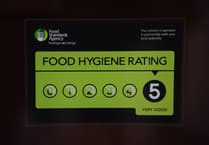A SOLICITOR who borrowed money from the funds of deceased clients without permission has been struck off the register.
Nicholas Skinnard, previously sole practitioner of the firm Blight Broad and Skinnard, did not appear and chose not to have representation at a hearing of the Solicitors Disciplinary Tribunal on September 17 and 18, and admitted the case against him.
The firm’s office in Callington was closed down suddenly in November 2019 after the Solicitors Regulation Authority began investigating Mr Skinnard, a well-known figure locally and also previously a head coach at Saltash Rugby Club. The office of Blight Skinnard in Saltash, which was unconnected with the investigation but where Mr Skinnard had previously been a partner, also closed its doors in the aftermath.
The tribunal heard that, between 2016 and 2019, Mr Skinnard made improper payments and inter-ledger transfers, made loans between accounts without the knowledge or authorisation of the estate’s executors or other beneficiaries, and used client monies for his own benefit.
On one occasion he used £83,748 from a client account for which he was the executor to pay a personal tax bill, later repaying this unauthorised loan to himself from another unconnected client account.
In taking these actions, Mr Skinnard acted dishonestly and breached the rules, code of conduct and principles of the Solicitors Regulation Authority, said the SRA.
Mr Skinnard had also failed to progress client affairs in a timely manner, failed to keep clients informed with accurate information, and failed to make prompt payments.
On one occasion he applied for probate four-and-a-half years after the death of the client, said the authority.
The SRA was alerted to Mr Skinnard’s activities in December 2018, when a charity complained about a delay in payment of a legacy.
An inspection of the firm began in August 2019, during which Mr Skinnard was interviewed and in the October, the forensic investigation officer made a report.
As of August 2019, Mr Skinnard had made almost £3.5million in loans either to clients or other known individuals. Six ledger transfers considered to be improper were identified as examples of probate loans giving rise to a minimum cash shortage on client accounts of £287,070, of which £122,884 remained outstanding at the date of the report.
During investigation, Mr Skinnard said that he had operated the system of money moving “for decades” and that the firm had been doing it even longer.
While he said he believed himself to be acting in good faith and properly at the time, he began to accept that he was in breach of the rules, but did not accept that he had acted dishonestly.
In a letter marked by Mr Skinnard to be opened after the verdict had been made against him, he said that he had operated the loans system in compliance with the regulations in existence between 1957-2012, and that he had been audited in 2003 by the Law Society who did not raise concern at the time.
He regretted that a rule brought in in 2012 “effectively outlawed what the firm had been doing for decades” and that it had “benefitted lenders and borrowers wonderfully well for about 100 years”, also saying that he was proud of the specialism, and that other firms were operating in a similar manner.
He said that he was working in an insecure driving job and living in a bedsit and said that were he to be fined he would have no way of paying it.
In its closing remarks, the Tribunal considered that Mr Skinnard had committed a gross breach of trust in misusing funds from the estates of deceased clients, and that those concerned “would certainly have been horrified by his dealings with their money and its being diverted from the purposes they intended”.
The tribunal found that there was a “clear lack of moral soundness” in Mr Skinnard’s approach, a disregard for his obligations and a failure to adhere to the ethical standards of his profession.
Mr Skinnard, who had been a solicitor since 1983, has been struck off the register and ordered to pay £39,173 in costs.
In separate employment tribunals held earlier this year, former employees of Mr Skinnard were found to be entitled to redundancy payments.




